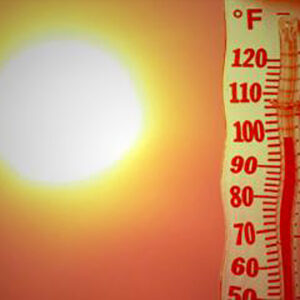
SRHD Shares Resources to Help Stay Cool During Forecasted Heat Wave
SPOKANE, Wash. – The National Weather Service (NWS) in Spokane has high confidence that a historic and extreme heat wave will occur this weekend and continue for an extended period of time, which can be especially problematic for those who are heat sensitive and those without effective cooling and/or adequate hydration, say experts at Spokane Regional Health District (SRHD).
According to NWS, daily, record-high temperatures will likely be broken each day with the all-time record of 108 degrees within reach during the peak of the heat wave, Monday through Thursday.
Those Most at Risk
Health officials explained children, seniors, individuals living homeless, people with chronic illnesses and people who take certain medications, such as blood pressure medications or antihistamines, are especially at risk for health problems associated with high temperatures, including heat exhaustion.
Recognizing Heat Stroke
- A body temperature above 103 degrees Fahrenheit
- Red, hot and dry skin that is not sweating A rapid, strong pulse
- A throbbing headache
- Dizziness
- Nausea
- Confusion
- Unconsciousness
Recognizing Heat Exhaustion
- Excessive sweating
- Paleness
- Muscle cramps/aches
- Tiredness
- Weakness
- Dizziness
- Headache
- Nausea or vomiting
- Fainting
Tips to avoid heat-related illness:
- Know the signs of heat-related illness.
- Drink plenty of water or fruit and vegetable juices. Avoid caffeine or alcohol.
- Limit your time outdoors, especially in the afternoon when the day is hottest.
- Be careful about exercising or doing a lot of activities when it is hot. Stay out of the sun, take frequent breaks.
- Wear loose-fitting, light-colored cotton clothes, they are cooler than dark colors or some synthetics.
- If you live in a home without fans or air conditioning, open windows to allow air flow, and keep shades, blinds or curtains drawn in the hottest part of the day or when the windows are in direct sunlight. Try to spend at least part of the day in an air-conditioned place like a shopping mall, a store, the library, a friend’s house, or the movies. Cool showers can help, too.
- Do not use a fan when the air temperature is above 95 degrees -– it will blow hot air, which can add to heat stress.
- Check on family members, elderly and vulnerable neighbors, ensure they are staying cool and hydrated.
To learn about heat exhaustion, heat stroke sunburn, heat cramps, heat rash and how to treat them, visit srhd.org’s Extreme Heat website.
Community Cooling Resources
Please visit our "Where to Find a Cooling Center" page for cooling center locations and hours.
Guidance for Outdoor Activities in Excessive Heat
Guidance for Outdoor Activities in Excessive Heat
Closed Vehicles are DANGEROUS
Health officials also warn that the temperature inside a parked car can reach more than 120 degrees in as little as 10 minutes. Direct sunlight and dark-colored interiors further speed the process. Children, the elderly and animals should never be left in a parked car, even for a few minutes and even with the windows open. Lock parked cars to prevent children from playing in them, and it’s advised to leave pets at home even for short trips.
SRHD advises people to call 911 if they see children or pets locked in an unattended vehicle.
What to do if there is a Power Outage
Food Storage:
- A full fridge or freezer will keep food longer than a half full or empty one. In general, a full freezer will keep food frozen for about two days if it isn’t opened. If it is half full, the food will only last about one day.
- Keep the fridge closed. The less the door to the fridge or freezer is open, the colder the inside will stay. If possible, eat foods that do not need to be refrigerated (snacks, pasta, rice) or know what you want before you open the door.
Keeping the House Cool:
- Keep windows and doors closed. Try to not let the outside air come in or the inside air go out. Quickly open and close the doors if you need to leave.
- Block the sun. Pull the curtains, blinds or shades to block the sun from coming in and heating up the room.
- Take a cold bath. Use the cold tap water in your home to cool off in a cold bath or shower. Air drying yourself and leaving your hair wet will help you to stay cool longer.
- Use flashlights instead of candles to reduce fire hazards.

